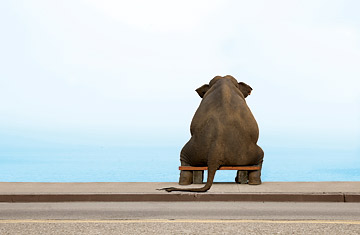
These days, Republicans have the desperate aura of an endangered species. They lost Congress, then the White House; more recently, they lost a slam-dunk House election in a conservative New York district, then Senator Arlen Specter. Polls suggest that only one-fourth of the electorate considers itself Republican, that independents are trending Democratic and that as few as five states have solid Republican pluralities. And the electorate is getting less white, less rural, less Christian--in short, less demographically Republican. GOP officials who completely controlled Washington three years ago are vowing to "regain our status as a national party" and creating woe-is-us groups to resuscitate their brand, while Democrats are publishing books like The Strange Death of Republican America and 40 More Years: How the Democrats Will Rule the Next Generation. John McCain's campaign manager recently described his party as basically extinct on the West Coast, nearly extinct in the Northeast and endangered in the Mountain West and Southwest.
So are the Republicans going extinct? And can the death march be stopped?
The Washington critiques of the Republican Party as powerless, leaderless and rudderless--the new Donner party--are not very illuminating. Minority parties always look weak and inept in the penalty box. Sure, it can be comical to watch Republican National Committee (RNC) gaffe machine Michael Steele riff on his hip-hop vision for the party or Texas Governor Rick Perry carry on about secession or Minnesota Congresswoman Michele Bachmann explain how F.D.R.'s "Hoot-Smalley" Act caused the Depression (the Smoot-Hawley Act, a Republican tariff bill, was enacted before F.D.R.'s presidency), but haplessness does not equal hopelessness. And yes, the Republican brand could benefit from spokesmen less familiar and less reviled than Karl Rove, Dick Cheney and Newt Gingrich, but the party does have some fresher faces stepping out of the wings.
The Democratic critiques of the GOP--that it's the Party of No, or No Ideas--are not helpful either. It's silly to fault an opposition party for opposition; obstructionism helped return Democrats to power. Republicans actually have plenty of ideas.
That's the problem. The party's ideas--about economic issues, social issues and just about everything else--are not popular ideas. They are extremely conservative ideas tarred by association with the extremely unpopular George W. Bush, who helped downsize the party to its extremely conservative base. A hard-right agenda of slashing taxes for the investor class, protecting marriage from gays, blocking universal health insurance and extolling the glories of waterboarding produces terrific ratings for Rush Limbaugh, but it's not a majority agenda. The party's new, Hooverish focus on austerity on the brink of another depression does not seem to fit the national mood, and it's shamelessly hypocritical, given the party's recent history of massive deficit spending on pork, war and prescription drugs in good times, not to mention its continuing support for deficit-exploding tax cuts in bad times.
